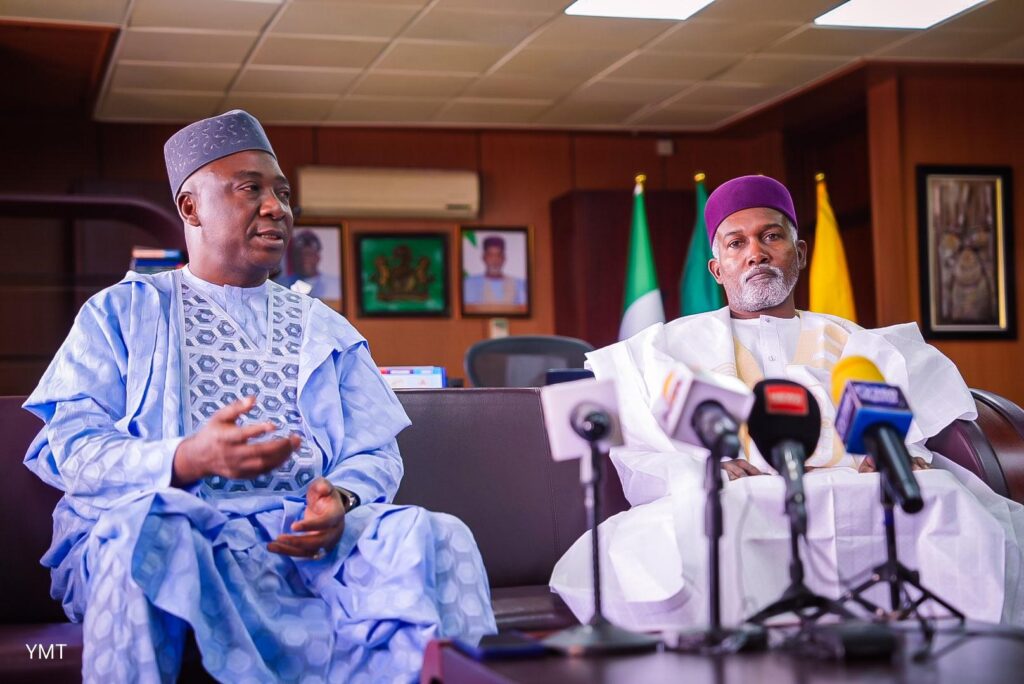NEWS
FG didn’t Apologise to Libya after Maltreating NFF Officials, Players —Minister

The Federal Government has refuted a report, which claimed that Nigeria had apologised over the recent maltreatment of Nigerian Football Federation officials and its senior national football team in Libya.
The Minister of Foreign Affairs, Amb. Yusuf Tuggar, made this known in a statement issued on Wednesday in Abuja by Alkasim Abdulkadir, his Special Assistant on Media and Communication Strategy.
It stressed that the report, which was published on Oct.
15 by the Libya Observer, claiming that Nigeria had apologised over the incident was erroneous.The statement added that the minister also expressed the Federal Government’s strong displeasure over the incident and the said report.
According to Tuggar, the report deliberately aims at gaining political leverage and causing disaffection among continental football administrators and fans.
It quoted the minister as saying that the report was a blatant misinformation and misrepresentation of the telephone correspondence between him and the Foreign Minister of Libya’s Eastern Government.
“Nigeria remains unequivocal in expressing its displeasure and disappointment with how the Nigerian Football Federation (NFF) officials were treated in Libya.
“It calls on the Confederation of African Football to urgently ensure that its Disciplinary Board investigates the matter and imposes appropriate sanctions based on its statutes,” Tuggar said.
The minister further explained that the Constitution Drafting Assembly (CDA) of Libya’s Government of National Unity had been summoned by the Ministry to seek an immediate end to the unfortunate incident.
It said that no diplomatic headway was made during the meeting with Libya’s acting Charge d’Affaires, Imad Aboud, who said the matter was not under the jurisdiction of Tripoli, which he represented.
It said that Aboud claimed that the matter was rather under the jurisdiction of Libya’s Eastern Government in Benghazi.
The statement further said that Tuggar immediately contacted Abdelhadi Lahweej, the Foreign Minister of the Eastern Government, for prompt intervention in order to end the debacle.
“After that, the aircraft was given the necessary permits to fly, aviation fuel was accessed, and both ministers agreed that the matter should be de-escalated immediately.
“Even when Lahweej insisted on rehashing untruth about the treatment of Libyan players in Nigeria, Tuggar once again corrected the misinformation about mistreatment of Libyan players during the Nigerian encounter.
“He did not apologise or regret the treatment of Libyan officials and players because the account was inaccurate,” the minister was quoted as saying.
“Lahweej proposed a joint statement, which the Ministry rejected because it erroneously misrepresented the facts of the incident.
“Above all, Nigeria only shares a diplomatic relationship with the government of National Accord and not with the Eastern Government,” the statement added. (NAN)
NEWS
DHQ Rebuts Allegation of Internal Sabotage in Benue Massacre

The Defence Headquarters (DHQ) has dismissed the allegation suggesting that internal sabotage within the Nigerian military contributed to the tragic events in Yelwata, Benue.The Director of Defence Information, Brig.-Gen. Tukur Gusau, in a statement on Tuesday, said the claims were unfounded and not supported by credible evidence.
Gusau said the Nigerian military had consistently denied any involvement in the massacre. According to him, the Chief of Defence Staff (CDS), Gen. Christopher Musa, has publicly stated that the military was not responsible for the killings in Yelwata.“Furthermore, the Nigerian Military has emphasized its commitment to protecting civilians and upholding the rule of law.“There is no credible evidence to substantiate claims of internal sabotage within the military related to the Yelwata incident.“Investigations by independent bodies, including human rights organizations, have not found any links between the military and the perpetrators of the massacre.“The violence in Yelwata is part of a broader pattern of intercommunal clashes in Nigeria’s Middle Belt region, primarily between farmers and herders.“These conflicts are driven by longstanding disputes over land and grazing rights, ethnic tensions, and competition for resources,” he said.Gusau said that while the military had been deployed to maintain peace, the root causes of the violence lied in complex socio-economic and political factors.He added that attributing the Yelwata massacre to internal sabotage within the Nigerian military was misleading and detracts from the real issues at play.According to him, it is essential to focus on addressing the underlying causes of intercommunal violence and to support efforts aimed at fostering dialogue, reconciliation, and sustainable peace in the affected regions.“The CDS has only called for a holistic approach and the need for the cummunities and the security agencies to work closer to address the issue.“He also call on the communities not to hide criminals and also assure them the military ans other security agencies are there to protect lives and properties of law abiding citizens,” he added. (NAN)NEWS
Benue killing: NAF Deploys More Air Assets in Op Whirl Stroke

As part of sustained efforts to restore peace and stability across the North Central region, the Nigerian Air Force (NAF) has deployed additional air assets under Operation Whirl Stroke (OPWS).This is contained in a statement by the Director, Public Relations and Information, NAF, Air Commodore Ehimen Ejodame, on Tuesday in Abuja.
Ejodame said the strategic move had reinforced the NAF’s commitment to enhancing security, supporting ground operations, and reassuring communities affected by banditry, kidnapping, and communal unrest. He said the Chief of the Air Staff (CAS), Air Marshal Hasan Abubakar, conducted a firsthand evaluation of air operations under OPWS, to assess the effectiveness of these expanded efforts.According to him, the visit included a high-level strategic engagement held on Tuesday, at the Headquarters Tactical Air Command, Makurdi.Ejodame said the Chief of Army Staff, Lt.-Gen. Olufemi Oluyede; a representative of the Chief of the Naval Staff, Rear Adm. Olusegun Ferreira; the Commander of OPWS; and the Maritime and Air Component Commanders, alongside other key stakeholders, were part of the meeting.According to Ejodame, critical updates were provided on the current tempo of joint operations aimed at restoring lasting peace across the region.In his remarks, the CAS revealed that the newly deployed air assets had been successfully integrated into ongoing operations, delivering real-time intelligence and precision targeting support.He stated NAF aircraft had continued to conduct surveillance, armed reconnaissance, close air support, and precision strike missions with remarkable success.Abubakar noted that the current deployment aligns with the Federal Government’s overarching mission to stabilise the Middle Belt region.He highlighted the impact of recent coordinated air and ground operations across Benue, Nasarawa, and Taraba States, which have led to the dismantling of several militia camps, bandit enclaves, and criminal hideouts.“These outcomes reinforce our unwavering commitment to protecting innocent lives and supporting national peace-building initiatives.“As long as peace is threatened, our resolve remains unshaken.“The NAF will continue to deliver timely, decisive air support in synergy with sister services, ensuring the protection of lives and properties while advancing our mission of restoring peace to the Middle Belt and beyond,” he said.The Service Chiefs jointly emphasised the importance of synergy among the armed forces and other security agencies, noting that jointness remains a cornerstone for operational success under Operation Whirl Stroke.They reiterated that the ongoing operations are part of a broader goal to create a secure environment where residents can live and conduct their legitimate activities without fear. (NAN)NEWS
Tinubu Reiterates Commitment to Fast-Track Approvals for Viable Projects

President Bola Tinubu, on Tuesday restated the determination of his administration to fast-track approvals for viable infrastructural projects in the country.Tinubu, represented by Vice President Kashim Shettima, made this known at the 2025 Nigeria Public-Private Partnership (PPP) Summit on Tuesday in Abuja.
The president therefore urged private sector partner to be focused and more committed. According to him, what matters to the average Nigerian is the availability of basic infrastructure such as power, roads, health facilities and quality schools. He called for a more strengthened public-private sector partnership that emphasises innovation, efficiency, commitment and integrity above mere capital and investments.” We need more than investment. We need innovation, we need efficiency, and above all, we need integrity.” I urge you to look beyond the risks and recognise the immense opportunity to shape a nation that is not just rising, but ready.“The projects that emerge from this summit must not gather dust on paper or linger in bureaucratic limbo.” We will fast-track approvals for viable projects. We will ensure coordination across Ministries, Departments, and Agencies to enable swift implementation.“We do this because we know that what matters to the average Nigerian is not promises, but power in their homes, roads to their farms, access to clean water, modern hospitals, and quality schools. We must build.” We must deliver. And we must do it together,” he said.He observed that a 21st-century economy cannot be built on 20th-century infrastructure, pointing out that the “old model of public-only infrastructure funding is no longer sustainable.“Our national aspirations far exceed what public budgets alone can deliver. That is why we must innovate, and why we must work together.” We are not looking for investors to carry burdens. We are offering opportunities to create value.” We seek long-term partners who are ready to help us bridge our infrastructure gap with purpose and precision,” he added.Tinubu recalled that his administration, on assumption of office two years ago, was quite aware “that a functional relationship between the public and private sectors would be the magic wand of transformation.”He reaffirmed that the administration was still fully committed to that very public-private partnership that is passionate about delivering sustainable and inclusive infrastructure.” We have strengthened the Infrastructure Concession Regulatory Commission and enhanced its capacity to regulate, superintend, and de-risk PPP transactions.” We are determined to deliver infrastructure that is both sustainable and inclusive. Our economic reforms have laid a stable foundation.” From the removal of unsustainable subsidies to the liberalisation of the foreign exchange regime and the optimisation of government revenues, we have acted boldly and responsibly.“We are streamlining bureaucratic bottlenecks and improving transparency in our project pipelines.” We have aligned our processes with global best practices and investor expectations.”The President urged participants to ensure the event is “remembered not for fine speeches, but for bankable projects, signed deals, and enduring progress.”The Minister of Interior, Mr Tunji Ojo, commended the ICRC for championing game-changing projects across diverse sectors.Ojo noted that with President Tinubu and Vice-President Shettima in the saddle, Nigeria is taking its rightful place in the comity of nations.The Regional Director, Central Africa and Anglophone West Africa, IFC, Dahlia Khalifa, applauded the ongoing reform in Nigeria’s PPP framework.Khalifa acknowledged IFC’s collaboration with authorities across key sectors to achieve the country’s overall objectives and strengthening the existing relationship between the organisation and Nigeria.She added that Nigeria under President Tinubu has demonstrated strong commitments to timely and transparent resolution of disputes arising from PPP projects.Solomon Quaynor, the Vice President for Private Sector, Infrastructure and Industrialisation at the African Development Bank, said the theme of the summit implies that partnerships are not just optional but are essential.He said the infrastructure deficits “demand that the government and the private sector work together in commercially viable PPPs.”Quaynor added that the bank was working with other partners on the Lagos-Abidjan highway project to boost regional economic integration in West Africa.“PPPs are complex long-term projects. They need to be designed properly and designed to survive different political administrations because by their very nature, they are long-term,” he stated. (NAN)
















